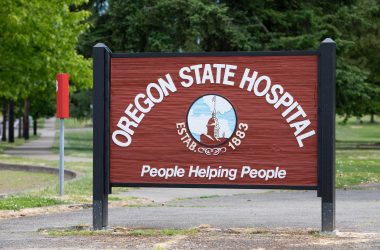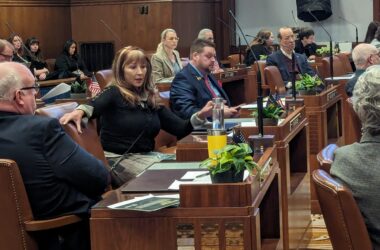After spending hundreds of millions in the past year to get people off the streets and into shelters, Gov. Tina Kotek and the Oregon Legislature say they’re focused on addressing the state’s underlying housing crisis.
Kotek and the co-chairs of her Housing Production Advisory Council laid out their priorities in meetings with legislative leaders, housing committees and reporters over the past week. Lawmakers will have a short timeframe – just 35 days beginning Feb. 5 – to approve any new spending and pass new laws to put a dent in a housing shortage that’s been building for decades.
The focus on housing follows the Legislature allocating more than $330 million this spring for homeless shelters and moving formerly homeless people into permanent housing, according to Oregon Housing and Community Services.
“We need to have an infrastructure of shelter across the state, and we are enhancing that network, but the goal is not to grow shelter,” Kotek said. “The goal was to get more housing, so people can move from shelters and into long-term housing.”
Her solution is to nearly double the number of homes built in Oregon over the next 10 years. Meanwhile, the cities where those homes will be built are raising alarms about not having money to pay for roads and sewers for the new homes while lawmakers are exploring other ways to make homes more affordable and accessible, from cracking down on short-term rentals to simplifying rental applications.
Building more
One of Kotek’s first actions as governor was creating the Housing Production Advisory Council, which will produce a set of recommendations by the end of the year on how the state can build 36,000 homes annually over the next decade. Oregon has averaged closer to 18,000 homes annually in recent years, exacerbating an existing shortage of more than 140,000 homes.
At least half of the new homes need to be affordable to people making 80% or less of the median income, council co-chair and Portland land-use attorney Damien Hall told the Senate Housing and Development Committee last week. A current statewide median household income of around $70,000 would mean home costs, including rent or mortgage payments and utilities, would need to be less than $1,400 a month for families to meet the standard of spending no more than 30% of gross income on housing costs.
“People are becoming homeless faster than the state’s been able to rehouse people living outside, and the solution here is to build more housing,” Hall said.
Kotek said during a press conference late last week that passing some of the council’s recommendations is her top priority for the 35-day legislative session that begins in February. Others, like a draft recommendation to loosen restrictions around building in wetlands, likely won’t come up, she said.
There’s a bipartisan consensus in the House around increasing housing production – House Majority Leader Julie Fahey, D-Eugene, was previously chair of the chamber’s housing committee, and new House Minority Leader Jeff Helfrich, R-Hood River, is the committee’s vice chair.
The two championed a Kotek housing bill to make it easier for cities to annex land for homebuilding. A bipartisan coalition of House lawmakers from throughout the state voted for the bill over objections from environmentalist Democrats and conservative farmers, but the measure failed in the Senate.
The Democrat-controlled Senate may prove a problem for Kotek as she again tries to pass legislation to speed up homebuilding. During last week’s hearing, Sen. Deb Patterson, D-Salem, expressed skepticism that the state needed to build more homes, saying it seemed to her like the housing affordability problem was tied to second homes and vacation rentals.
“I’m a little surprised by the line of questioning, even questioning whether or not we have a problem,” Kotek said. “We do have a problem. And we just need to get more information out there if those are the questions we’re hearing.”
City infrastructure
Cities throughout the state are facing budget shortfalls as federal COVID relief money expires and inflation drives up costs. Several cities, including Salem, opened additional shelters and homeless programs during the pandemic and are now considering cutting them.
Those pressing budgetary problems come as cities anticipate needing developers to build more homes. They can pass costs for new roads, sidewalks, sewers and water lines on to developers, either to build themselves or to pay into a pot through system development charges. But those expenses in turn raise the cost of housing or prevent homes from being built.
It’s a problem affecting cities large and small. Holly Kerns, director of the Baker City and County Planning Department, told senators that the eastern Oregon city, with a population of about 10,000, has 200 completely vacant acres of residential land waiting for housing and employers who are having a hard time hiring because would-be employees can’t find homes.
The biggest reason homes aren’t being built is infrastructure costs, Kerns said. Cities can spur building by waiving system development charges, but then they can’t pay for needed infrastructure.
Amy Pepper, development engineer manager for the city of Wilsonville, told lawmakers some state funding could spur building. Wilsonville, an outlying Portland suburb, has grown rapidly over the past 30 years, but its population growth outpaces new homebuilding.

New ideas
Lawmakers also used meetings last week to float ideas for new housing laws. Helfrich, the Republican leader on the House housing committee, and Rep. Mark Gamba, D-Milwaukie, are working on a proposal to create a universal rental application.
Tenants now fill out separate applications and pay separate fees for every apartment. In tight rental markets, that can mean spending hundreds or even thousands of dollars and hours filling out similar forms. Landlords have to refund fees if they don’t screen an applicant, and someone who applies for multiple units managed by the same person or company within 60 days only have to pay one fee.
Helfrich and Gamba are still working out details of their proposal and aren’t sure whether they’ll have a bill in 2024 or 2025. The general idea is to allow tenants to obtain their own report with a criminal background check, rental and credit history and employment verification. They’d pay one time, and landlords would have to accept those reports.
“This is definitely a change in the industry and a change in the way we do business,” Helfrich said.
Another bipartisan pair, Bend Democratic Rep. Emerson Levy and Tillamook Republican Cyrus Javadi, spent the summer looking at short-term rentals. They play a role in reducing available homes, especially in tourist destinations in Bend and the coast.
Javadi said he owns one short-term rental property on the coast, a three-bedroom, 1,000-square-foot home with a $4,500 mortgage payment. A family couldn’t afford that cost, he said.
He and Levy looked at programs from other states, including incentives in Big Sky, Montana; Sedona, Arizona, and Portland, Maine, that paid property owners to rent to employees of local businesses.
“This has been very successful in tourist areas, but it is only a backstop,” Levy said. “This is not something that can work forever, but it can get you until you can build more housing.”
Oregon Capital Chronicle is part of States Newsroom, a network of news bureaus supported by grants and a coalition of donors as a 501c(3) public charity. Oregon Capital Chronicle maintains editorial independence. Contact Editor Lynne Terry for questions: [email protected]. Follow Oregon Capital Chronicle on Facebook and Twitter.
STORY TIP OR IDEA? Send an email to Salem Reporter’s news team: [email protected].

Julia Shumway is deputy editor of Oregon Capital Chronicle and has reported on government and politics in Iowa and Nebraska, spent time at the Bend Bulletin and most recently was a legislative reporter for the Arizona Capitol Times in Phoenix. An award-winning journalist, Julia most recently reported on the tangled efforts to audit the presidential results in Arizona.









